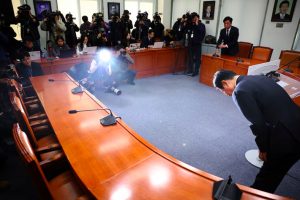The ongoing political crisis in Asia’s fourth-largest economy deepened on Friday after the South Korean parliament impeached its second leader in two weeks.
South Korean lawmakers, led by opposition parties, impeached acting President Han Duck-soo, who took the country’s reigns on December 14 following the impeachment of Yoon Suk Yeol over his shock attempt to establish martial law.
The vote to impeach Han came after he declined to immediately appoint three justices to fill vacancies at the Constitutional Court, saying it would exceed his acting role.
Also on AF: Neighbours Worried About China’s Giant New Dam in Tibet
Opposition leader Lee Jae-myung of the Democratic Party, which has majority control of parliament, accused Han of “acting for insurrection”.
The motion for Han’s impeachment passed with 192 of the 300 votes.
Finance Minister Choi Sang-mok now assumes the role of acting president as the person next in line under the law. He is set to speak to the military chief and consult the foreign minister and acting defence minister, a spokesperson said.
“Impeaching Han would only mean prolonged political uncertainties,” Huh Jae-hwan, an analyst at Eugene Investment & Securities, said.
“In terms of financial markets, (Choi) taking charge can only be bad news, as it only goes to show that political turmoil is ongoing.”
There was a chance the country would plunge into economic troubles comparable to its devastating financial crisis of the late 1990s, Shin Yul, a political science professor at Myongji University, said.
The South Korean won retreated to 1,475.4 per dollar, down 0.53% by 1019 GMT. Before the vote, the currency briefly breached the 1,480-mark for the first time in nearly 16 years.
The blue-chip Kospi also pared some losses to close down by 1.02%. Leading the losses were technology firms, including chipmaker Samsung Electronics which fell 0.37%, automakers Hyundai and Kia, which slipped 1.38% and 2.33%, respectively, and battery maker LG Energy Solution, which dropped 1.02%.
Foreigners net sold shares worth 148.5 billion won ($100.3 million) on the main board on Friday.
What lies ahead?
Han’s impeachment has pushed South Korea’s once-vibrant democratic success story into uncharted territory.
In a statement after the vote, Han said he was saddened by what the unfolding events meant for the next generation, but accepted the outcome.
“I respect parliament’s decision and in order to avoid further chaos and uncertainty, I will suspend my duties in accordance with relevant laws,” he said.

He said he would await the decision of the Constitutional Court to review the impeachment motion.
The ruling People Power Party, which has objected to the opposition-led impeachment of Han, said it had filed a constitutional petition.
During the impeachment motion, PPP members surrounded the speaker’s podium, chanting that the vote was invalid and parliament had engaged in “tyranny”.
Meanwhile, South Korean broadcaster KBS World reported the country’s business sentiment fell to its lowest level since the Covid pandemic in 2020 amid the ongoing political chaos.
Experts and South Korean leaders noted earlier this month that the timing of the ongoing turmoil is particularly concerning for the country’s economy as it needs to prepare for the possible impacts of the tariff policies of incoming US president Donald Trump.
Worst political crisis in decades
Events since Yoon’s short-lived martial law declaration have sparked South Korea’s gravest political crisis since 1987, when widespread protests forced the ruling party of former military generals to accept a constitutional amendment bringing in a direct, popular vote to elect the president.
Yoon shocked the country and the world with a late-night announcement on December 3 that he was imposing martial law to overcome political deadlock and root out “anti-state forces”.
Within hours, however, 190 lawmakers defied the cordons of troops and police and voted against Yoon’s order. About six hours after his initial decree, Yoon rescinded it.
In the days that followed, opinion polls showed there was overwhelming public support for Yoon’s removal. After he refused the vacate the PM’s post, he was ultimately impeached — a decision which is now being reviewed by South Korea’s Constitutional Court.
Han’s impeachment comes on the day the court held its first hearing to review whether to overturn Yoon’s the impeachment and reinstate him or permanently remove him from office.
The court has 180 days to reach a decision. Justice Cheong Hyung-sik said the court would move swiftly in the case considering its gravity.
If Yoon is ousted, a new presidential election would be held within 60 days.
- Reuters, with additional editing and inputs from Vishakha Saxena
























